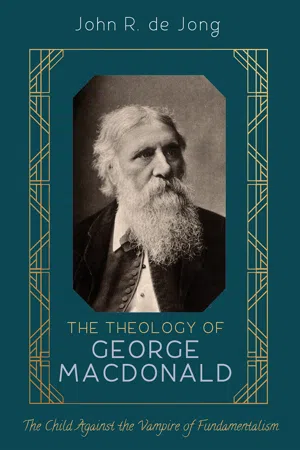![]()
1
The Context of George MacDonald’s Work
Like many Victorians, George MacDonald’s (1824–1905) journey was one of emancipation from “childhood” ways. His was a journey away from Calvinism in favor of a more benign vision of Christianity at the center of which is the image of “the child,” an axiomatic image symbolizing both the nature of God and the disposition of the faithful. One Presbyterian critic, George McCrie, lamented that “the childlike” was something that he “constantly harps about” resulting in “religious opinions, which are most unsound and dangerous.” The central question we explore here is: What are the theological implications of MacDonald’s understanding and use of this motif?
In answering this question, it becomes apparent that “the child” (MacDonald’s shorthand for all of a childlike disposition, henceforth not in quotes), far from being a submissive, acquiescent juvenile content to submit to the whims of elders—notably worldly religious elders—is, rather, a force that challenges the latter’s rule and wisdom. The child represents a theology that is “unsound and dangerous” to those such as McCrie, for in MacDonald’s mind he and those like him represented a church that had turned its back on childhood, that is, had forsaken worship of the Christ child and instead allowed a vampire to take up residence at its heart—one that drank the blood of the saints rather than offering Eucharistic life. This is the essential message of one of MacDonald’s last and most enigmatic fantasy novels, Lilith. Before reading this narrative, however, we lay thoughts of vampires to one side as we meet various incarnations of MacDonald’s child and, through these encounters, build up a picture of his theology and the world in which it was forged.
Theology and Literature
Before we begin this task, however, some comments are necessary regarding the validity of reading MacDonald’s work—especially his novels—as theology. What is the relationship between theology and literature?
George McCrie’s decisive rejection of MacDonald’s theology highlights a deeper issue—a profound suspicion, among conservative Evangelicals in particular, of narrative writing as a medium to express or explore theology. McCrie articulates the prevailing view: being imaginative, rather than concerned with the “true facts” of Evangelical religion, it results in “our poets and novelists . . . teaching an erroneous theology with all the earnestness of missionaries”; those with aesthetic gifts have sold their souls to the devil and become “patrons of heresy.” Such should stick to their role of providing entertainment, not “theologizing.” “Their peculiar office is to delight and entertain the world rather than to preach or to prophecy.” The implication is that the imprecision of literature is unsuitable to express the “facts” of theology; that literature is merely the frothy surface hiding a substrate of true (or false)—that is, logically verifiable (or discountable)—bedrock beliefs.
This highlights a fundamental polarity that will surface regularly in this volume: the antagonism between those such as MacDonald who view imagination as God’s primary gift to humans in the service of cognition and epistemology, and those such as McCrie who is of the opinion that:
Put differently: imagination is a useful, if capricious, force that may provoke change but offers a poor theological foundation. In response to this charge, I briefly outline some considerations that will help us to approach MacDonald’s literary opus as theologians with less cynicism.
To engage in theology is, in a fundamental sense, to become a worshipper. God cannot be the object of human investigation for this would require an impossible perspective “outside” of being; rather, investigation into the nature of God can only be the result of personal interaction with God, should God so permit—a permission, it would appear, granted only to those who are humble; to those who recognize their dependency on, and subordinacy to, God—the “babes” of Matthew 11:25 to whom, uniquely, are revealed the secrets of the kingdom of heaven. In MacDonald’s language, true theology is understood, practiced, and expressed only by the child, one who embodies this submissive, worshipful attitude. Three further considerations are evident: first, that since theology’s “object” is not only infinite but personal, it can never be fully known; second, that such knowledge is essentially “storied” in that the truth regarding a person cannot be established by factual statements, however verifiable or logically correct; third, that truth is imprecise since subjectively perceived.
One might counter this by suggesting that theology is essentially a second-order, objective reflection on such personal stories, notably the gospel narratives’ articulation of Christ, but, in light of the “personality” or person-based nature of truth, literature may be viewed as not only a source of personal or imaginative fuel for subsequent reflection, but as itself a means of theological reflection and articulation. One thinks, for example, of Augustine’s Confessions, Dostoevsky’s novels, or the works of Dante. Speaking of Dante’s Commedia, for example (a poem that has significantly shaped European theology), Vittorio Montemaggi proposes that truth is always the fruit of “human encounter” (truth, in other words, is always in some sense embodied) and that—in recognition of this—literature such as Dante’s draws the reader into a personal encounter with the author, others, and ultimately God. In Montemaggi’s words: “Dante’s text requires us to read it not only objectively but also by consciously situating our interpretation of it in the context of our subjective, first-person experience.” MacDonald is similarly driven by a conviction that theology involves more than the objective, academic analysis of presenting facts; rather, subjective engagement is required with the source of those facts—God. To this end, he writes imaginatively, dema...
